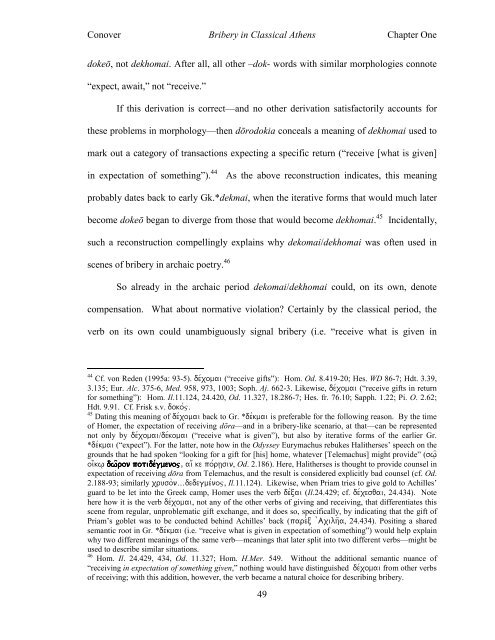BRIBERY IN CLASSICAL ATHENS Kellam ... - Historia Antigua
BRIBERY IN CLASSICAL ATHENS Kellam ... - Historia Antigua
BRIBERY IN CLASSICAL ATHENS Kellam ... - Historia Antigua
You also want an ePaper? Increase the reach of your titles
YUMPU automatically turns print PDFs into web optimized ePapers that Google loves.
Conover Bribery in Classical Athens Chapter One<br />
dokeō, not dekhomai. After all, all other –dok- words with similar morphologies connote<br />
“expect, await,” not “receive.”<br />
If this derivation is correct—and no other derivation satisfactorily accounts for<br />
these problems in morphology—then dōrodokia conceals a meaning of dekhomai used to<br />
mark out a category of transactions expecting a specific return (“receive [what is given]<br />
in expectation of something”). 44 As the above reconstruction indicates, this meaning<br />
probably dates back to early Gk.*dekmai, when the iterative forms that would much later<br />
become dokeō began to diverge from those that would become dekhomai. 45 Incidentally,<br />
such a reconstruction compellingly explains why dekomai/dekhomai was often used in<br />
scenes of bribery in archaic poetry. 46<br />
So already in the archaic period dekomai/dekhomai could, on its own, denote<br />
compensation. What about normative violation? Certainly by the classical period, the<br />
verb on its own could unambiguously signal bribery (i.e. “receive what is given in<br />
44<br />
Cf. von Reden (1995a: 93-5). de/xomai (“receive gifts”): Hom. Od. 8.419-20; Hes. WD 86-7; Hdt. 3.39,<br />
3.135; Eur. Alc. 375-6, Med. 958, 973, 1003; Soph. Aj. 662-3. Likewise, de/xomai (“receive gifts in return<br />
for something”): Hom. Il.11.124, 24.420, Od. 11.327, 18.286-7; Hes. fr. 76.10; Sapph. 1.22; Pi. O. 2.62;<br />
Hdt. 9.91. Cf. Frisk s.v. doko/j.<br />
45<br />
Dating this meaning of de/xomai back to Gr. *de/kmai is preferable for the following reason. By the time<br />
of Homer, the expectation of receiving dōra—and in a bribery-like scenario, at that—can be represented<br />
not only by de/xomai/de/komai (“receive what is given”), but also by iterative forms of the earlier Gr.<br />
*de/kmai (“expect”). For the latter, note how in the Odyssey Eurymachus rebukes Halitherses’ speech on the<br />
grounds that he had spoken “looking for a gift for [his] home, whatever [Telemachus] might provide” (sw= |<br />
oi1kw| dw=ron dw=ron potide/gmenoj<br />
potide/gmenoj, potide/gmenoj ai1 ke po/rh|sin, Od. 2.186). Here, Halitherses is thought to provide counsel in<br />
expectation of receiving dōra from Telemachus, and the result is considered explicitly bad counsel (cf. Od.<br />
2.188-93; similarly xruso\n…dedegme/noj, Il.11.124). Likewise, when Priam tries to give gold to Achilles’<br />
guard to be let into the Greek camp, Homer uses the verb de/cai (Il.24.429; cf. de/xesqai, 24.434). Note<br />
here how it is the verb de/xomai, not any of the other verbs of giving and receiving, that differentiates this<br />
scene from regular, unproblematic gift exchange, and it does so, specifically, by indicating that the gift of<br />
Priam’s goblet was to be conducted behind Achilles’ back (pare\c 0Axilh=a, 24.434). Positing a shared<br />
semantic root in Gr. *de/kmai (i.e. “receive what is given in expectation of something”) would help explain<br />
why two different meanings of the same verb—meanings that later split into two different verbs—might be<br />
used to describe similar situations.<br />
46<br />
Hom. Il. 24.429, 434, Od. 11.327; Hom. H.Mer. 549. Without the additional semantic nuance of<br />
“receiving in expectation of something given,” nothing would have distinguished de/xomai from other verbs<br />
of receiving; with this addition, however, the verb became a natural choice for describing bribery.<br />
49

















